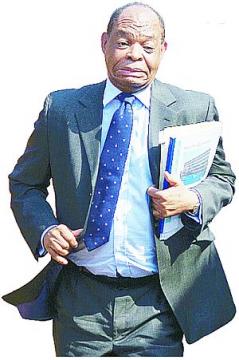GOVT HAS NO MONEY
 Minister of Finance Martin Dlamini, who will be part of the FSE/CC AGM on Friday.
Minister of Finance Martin Dlamini, who will be part of the FSE/CC AGM on Friday.
MBABANE – Fresh from giving public servants and politicians huge salary increments of up to 36 per cent and hosting a splendid SADC Summit, government faces serious cash flow challenges.
The Times SUNDAY has it in authority that government is currently struggling to meet some of its obligations. Some of the obligations affected include paying companies that supply government with a host of goods and services.
The situation is so serious that each time the Swaziland Revenue Authority (SRA) remits tax collections to government every week, the money is immediately used up. “What happens is that iyangena le-revenue, sibhadale sibhadale, sime layiphela khona and we wait for the next collection, siphindze sibhadale (when money is remitted to the government account, we fulfil our obligations until it gets finished, then wait for the next collection),” said Bheki Bhembe, Principal Secretary (PS) in the Ministry of Finance, in response to questions from this newspaper. “We only get relieved when we sign loan agreements for particular projects.”
The PS said the problem with such loans was that money meant for projects may not be diverted to other initiatives or obligations.
Bhembe said in a dry month, the SRA collects and remits around E60 million per week but towards the end of the tax year, they collect up to E300 million per week.
“Under domestic borrowing, government issues Treasury Bills, on a weekly basis and bonds regulated by the Central Bank are issued every quarter,” he said.
Government has also embarked on various initiatives to raise funds. These include, among others, borrowing money from the Central Bank, selling bonds and Treasury Bills, borrowing from parastatals and international funders.
Internationally though, funders have only shown interest in lending funds for specific projects.
These include among others health projects, the local government development project funded by the World Bank, the Manzini-Mbadlane road, which was funded by the African Development Bank and Kuwait, Badia and Abu Dhabi financiers.
Government problems began when, in February, Minister of Finance Martin Dlamini presented a budget of over E20 billion, which had a deficit E6.5 billion.
The budget is a statement of the revenue that government expects to collect over the next 12 months, and how it will be spent. The budget was largely based on projected collections by the SRA and revenue from the Southern African Customs Union (SACU), which were E14.4 billion. SRA was projected to collect E7.3 billion.
On top of that the budget was reliant on funds borrowed domestically and international loan institutions such as the World Bank, African Development Bank and others. The previous year’s national budget was E15.3 billion. The problem this financial year, 2016/17, has been caused by the decline of government revenue from the country’s share of proceeds from SACU.




 del.icio.us
del.icio.us Digg
Digg
Comments (0 posted):